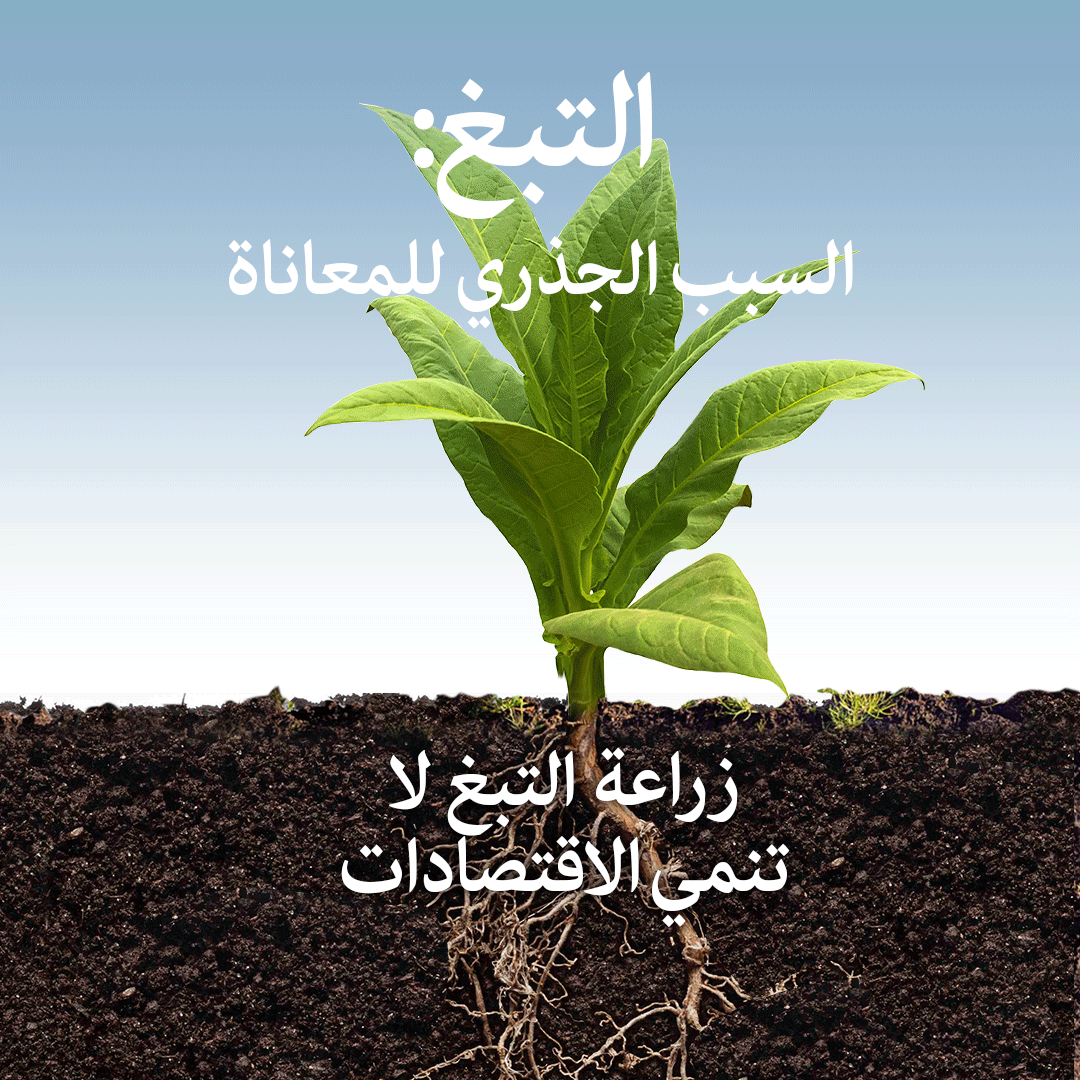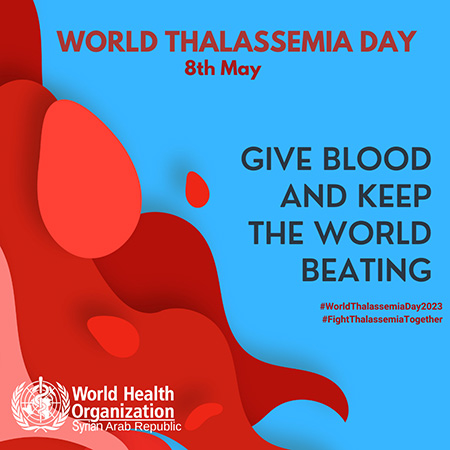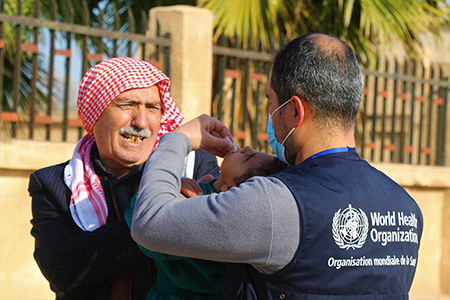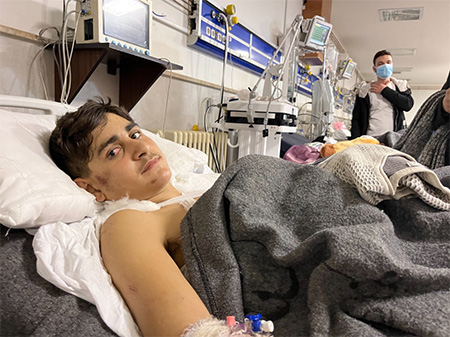Seeds of change: Syria swaps tobacco for sustainable crops
 31 May 2023 – Damascus, Syria – Countries around the world, including Syria, are observing World No Tobacco Day, with a focus on the call for food, not tobacco. Syria's tobacco control program, led by the Ministry of Health in collaboration with the World Health Organization, aims to reduce the effects of tobacco cultivation on government and public health.
31 May 2023 – Damascus, Syria – Countries around the world, including Syria, are observing World No Tobacco Day, with a focus on the call for food, not tobacco. Syria's tobacco control program, led by the Ministry of Health in collaboration with the World Health Organization, aims to reduce the effects of tobacco cultivation on government and public health.
"Interference from the tobacco industry makes it harder to transition away from tobacco cultivation, exacerbating the global food crisis," said Dr. Iman Shankiti, WHO Representative a.i in Syria. "We urge governments to stop subsidizing tobacco cultivation and redirect those funds to assist farmers in adopting more sustainable crops that enhance food security and nutrition. Through collaboration, we can ensure our communities enjoy better health, nutrition, and sustainable food."
In recent years, Syria has made remarkable progress in tobacco control. A total of 24 tobacco cessation clinics have been established across 14 government-owned facilities, providing consultations to approximately 3,000 visitors in 2020 and 2021. Additionally, The Tobacco Control Program has trained 50 healthcare professionals from two public hospitals in Damascus and rural Damascus on tobacco cessation programs. Two central coordination meetings were held to assess national progress on Tobacco FCTC policies, involving 60 Ministry of Health staff members, tobacco coordinators, and the Tobacco Control National Committee.
Syria's Tobacco Control Program is actively working to eliminate the illicit trade of tobacco products and endorse sustainable crop substitution. In 2022, the WHO assisted in the development of the National Tobacco Control Action Plan for 2021-2023 and facilitated a dialogue with the Eastern Mediterranean Regional Office of WHO (EMRO) about "Syria Next Steps." This dialogue aims to join the Protocol to Eliminate Illicit Trade in Tobacco Products, an international treaty with the goal of eliminating all forms of illicit tobacco trade through a set of measures that countries can adopt as a global solution to a global problem. Furthermore, the WHO worked with the Ministry of Health to conduct a two-day training workshop on implementing the WHO Framework Convention on Tobacco Control (FCTC) for parties navigating complex emergency situations.
In schools, universities, and households, the Ministry of Health has launched smoke-free initiatives with support from the WHO to raise awareness and provide educational materials. As part of the 2023 theme, the Tobacco Control Program seeks to highlight the extensive negative impact of tobacco product waste on the environment, economy, society, human health, biodiversity, and water bodies.
WHO supports a smoke-free future and a world where food is grown for nourishment rather than consumption. This approach will ultimately result in stronger communities. By backing the Tobacco Control Program of Syria in promoting sustainable food production, reduces the harmful effects of tobacco farming on health and the environment.
On World Thalassemia Day 2023, WHO acknowledges support of donors and health care workers who provide hope to thalassemia patients in Syria
 8 May, 2023 – On World Thalassemia Day 2023, WHO stands in solidarity with the thousands of thalassemia patients in Syria and their families.
8 May, 2023 – On World Thalassemia Day 2023, WHO stands in solidarity with the thousands of thalassemia patients in Syria and their families.
“Despite a weakened healthcare system in Syria as a result of years of conflict, there are still glimmers of hope everyday thanks to the support of donors and the tireless dedication of healthcare workers who make it possible for thalassemia patients in Syria to access to life-saving care,” said Dr Iman Shankiti, WHO Representative a.i. in Syria.
From remote villages to urban centers, healthcare workers and health partners have made a difference in the lives of patients – bringing hope and healing to those who need it most.
But the work is far from over. Thalassemia patients in Syria still face many challenges in accessing the treatment and care they need and the health system is facing shortages of medicine, equipment, and trained healthcare professionals.
“Despite ongoing conflict and the disruption of the healthcare system in Syria, WHO remains committed to supporting these patients and their families. This World Thalassemia Day, we pledge to continue our efforts to improve the health situation in Syria and ensure that every patient, no matter where they are, has access to the care and treatment they need. Together, with healthcare workers and aid organizations, we can make a difference and give a brighter future to those who need it most,” added Dr Shankiti.
WHO Joins Forces with UNICEF, Gavi, and the Syrian Ministry of Health to vaccinate unvaccinated children During World Immunization Week
 Vaccination in Al-Qamishli in North-East Syria7 May, 2023 –Damascus, Syria - the World Health Organization (WHO) together with UNICEF, Gavi, and the Syrian Ministry of Health, is proud to participate in World Immunization Week in Syria, from 7 to 11 May, to promote the life-saving benefits of vaccines and encourage more people to get vaccinated.
Vaccination in Al-Qamishli in North-East Syria7 May, 2023 –Damascus, Syria - the World Health Organization (WHO) together with UNICEF, Gavi, and the Syrian Ministry of Health, is proud to participate in World Immunization Week in Syria, from 7 to 11 May, to promote the life-saving benefits of vaccines and encourage more people to get vaccinated.
This year’s theme for World Immunization Week is “The Big Catch Up”, highlighting the role of vaccines in bringing people closer to their loved ones, communities, and goals. Through our participation in World Immunization Week in Syria, we aim to raise awareness about the importance of vaccines in preventing diseases and protecting individuals and communities.
During World Immunization Week, the joint collaborative efforts of WHO, UNICEF, and the Syrian Ministry of Health will focus on vaccinating as many people as possible against vaccine-preventable diseases through intensified multi-antigin vaccination campaign targeting under 5 children in all governorates. Different routine vaccines such as polio, rubella, and hepatitis-B will be provided during this campaign in addition to the provision of COVID-19 vaccine to targeted adults. In this campaign, vaccination services will be provided through fixed facilities and mobile teams in rural and hard to reach areas. In Additional to the provision of the needed technical assistance and on job training to healthcare workers, and conducting community outreach to promote vaccination.
“Vaccines are critical in preventing diseases and protecting communities,” said Dr Iman Shankiti, the World Health Representative a.i. in Syria. “By working together with all of our partners, including UNICEF, Gavi, and the Syrian Ministry of Health, we can ensure that everyone, no matter where they live, has access to life-saving vaccines. This collaboration is key to eradicating vaccine-preventable diseases and achieving universal health coverage.”
WHO is committed to promoting the health and well-being of people around the world, and vaccines are a critical tool in achieving that goal. Join us in celebrating World Immunization Week in Syria and supporting the power of vaccines to protect individuals and communities from deadly diseases.
WHO delivers critical healthcare support to earthquake-affected areas of Syria
 14-year Ahmad, receiving trauma services at a WHO-supported hospital in Aleppo.30 April 2023 – WHO has been working tirelessly to provide emergency health support to those affected by the recent earthquakes in Syria. As of 16 April, the organization has provided medical care and supplies to 41 000 individuals in affected areas.
14-year Ahmad, receiving trauma services at a WHO-supported hospital in Aleppo.30 April 2023 – WHO has been working tirelessly to provide emergency health support to those affected by the recent earthquakes in Syria. As of 16 April, the organization has provided medical care and supplies to 41 000 individuals in affected areas.
The recent earthquake has caused significant damage to health infrastructure in Syria, exacerbating an already challenging health crisis in the country. WHO has been working to provide critical medical care and supplies to those in need, including vaccinations, treatment for injuries and illnesses, and mental health support.
Since the occurrence of the earthquake, WHO has conducted a small-scale vaccination campaign, reaching over 197 000 children under the age of five. The organization has also provided 660 000 individuals with mental health and psychosocial support and referred over 3300 people to health facilities for reproductive and child health, internal medicine, and malnutrition care.
In addition, between 3 and 16 April, WHO has delivered over 129 metric tonnes of medicines, medical supplies, and equipment, valued at over $ 993 000 to health facilities in affected areas.
"We are deeply committed to delivering vital healthcare services and support to the earthquake-affected areas of Syria. Our teams have been working tirelessly to provide essential medical supplies, vaccinations, nutrition programs, and healthcare operations.” Said Dr Iman Shankiti, WHO Representative a.i. in Syria. “Through coordination, partnerships, and efficient logistics, we strive to make a positive impact on the well-being of the affected population. Together with our partners, we are dedicated to building resilience, ensuring access to quality healthcare, and creating a healthier future for all." Dr Shankiti added.
WHO is committed to continuing its efforts to provide lifesaving health support to those affected by the earthquakes in Syria. The organization is grateful for the support of its partners and donors and encourages others to join in its efforts to provide critical health care to those in need. For the earthquake response in Syria, WHO estimates it will require 60.2 million US$ for both the immediate 90-day response (18M) followed by short- and medium-term response needs (42.2M) for the rest of 2023.


